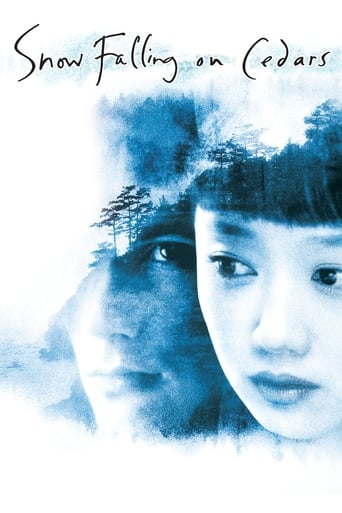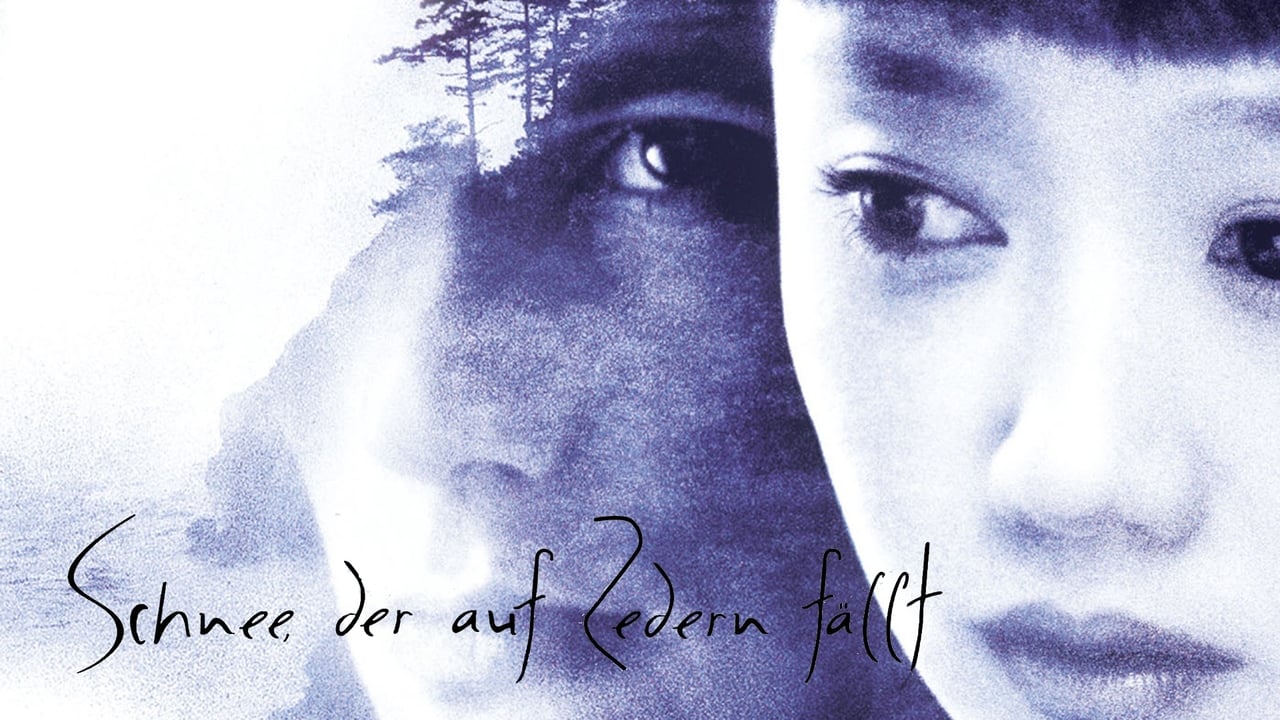INDIEFILMROCK45
This film is a travesty against it's source material - being one of the finer works of fiction from the 90s - and should be avoided by any and all who have read the novel. The wonderful cinematography aside, the film fails to deliver in nearly every aspect. Wooden acting; a script as stilted and predictable as a Louis L'Amour novel; and a lack of subtlety so apparent, it might as well be a PSA against racism all weigh heavily against this waste of film stock. Furthermore, and in collusion with the above statements, far too many liberties were taken with the novel to fairly call this a translation of the original. It merely preserves the strongest theme of novel - racism - and runs over the rest. Finally, the sex scenes present in the book are washed over so as to satisfy a PG13 rating, but these were absolutely pivotal to the understanding the characters and their motivations.
FilmSchoolWriter
Scott Hick's "Snow Falling on Cedars" is a lovely film really it is. Based on the book by David Guterson, "Snow Falling on Cedars" surrounds a murder trial taking place on a small fishing island off the coast of Washington State. Kazuo Miyamoto (Rick Yune) is on trial for the murder of a fisherman, Carl Heine (Eric Thal). But of course, the trial isn't simply a matter of murder, it's a matter of racial prejudice in a post-WWII era. Covering the story for the local newspaper is Ishmael Chambers (Ethan Hawke); who just happens to be in love with Miyamoto's wife, Hatsue (Youki Kudoh).The story is good. Rather "Casablanca"-esque. Maybe a little bit of "To Kill a Mockingbird", but it works. The screenplay, too, is well written with dialogue that fits the story and Hicks's point (he served as screenwriter in addition to directing).Acting wise, "Snow Falling on Cedars" is fine. Just fine. Nothing outrageously bad. Nothing outrageously good. (Although Max von Sydow gives a notable performance as Nels and Yune's performance is not without its merits) Ishmael Chambers is Hawke's standard role: brooding, compassionate, emotionally and physically wounded. But his performance is poor. The character deserved cold passion not just distant stares. This is a film, not a book. We have no way of knowing what is going on inside our protagonist's head. The casting of Kudoh as Hatsue might have been a mistake as well. Not that she isn't good (she's fine), but it is a notable part of the story that Hatsue and Kazuo though of Japanese heritage are *Americans*.No one can ignore the beautiful cinematography of "Snow Falling on Cedars". The images of the island in winter are breathtaking. In that aspect, "Snow Falling on Cedars" is almost a Western in that the landscape and weather are as much a part of the story as the characters we are faced with. And from that, comes the editing. What can be said about the editing? It's safe to say that "Snow Falling on Cedars" would never have been released had it been created in Hollywood's Studio Era. Rather, the editors would have had their heads chopped up and their bodies impaled on pikes as warnings to all editors to come: DO NOT MAKE EDITING OBVIOUS. IT DISTRACTS FROM THE STORY. In "Snow Falling on Cedars", there is no way that you *cannot* notice the editing. It's everywhere. All the time. In fact, it's practically omniscient. To put it gently, "Snow Falling on Cedars" is just one giant montage. To put it frankly, someone got a *little* too happy when it came to editing. And by a little too happy, I mean a LOT too happy. There is not a single five minute sequence without some sort of creative editing tweak or artistic camera angle. This is Hicks's attempt to out-gloss, out-imagine Orson Welles and "Citizen Kane." And it ruins the movie. The editing is just so pretentious and *there* that nothing else exists on screen."Snow Falling on Cedars" had potential. But it fails miserably. The cinematography and scenery may be stunning, but the editing ruins the film. No, I take that back. It doesn't ruin the film, it drops a nice big atomic bomb on it, so that all the audience gets is an f-ed up collage of gloss better suited for a midnight avant-garde screening than a full fledged cinema. A waste of my time. Avoid at all costs.
dwpollar
1st watched 8/26/2006 - 6 out of 10(Dir-Scott Hicks): Overly atmospheric but effective drama about a trial surrounding the death of a local fisherman in a post WWII Japanese-racist local town. The man on trial for the possible murder of this local man happens to be of Japanese descent. The story is shown in the eyes of a local reporter played by Ethan Hawke who's past reveals a relationship with the defendant's wife which is used as an extra storyline to explore the racism against Japanese descendants in the United States in the early 50's shortly after World War II ends. The internment camps that the Japanese were forced into by the Americans is explored for the first time in the movies here as well. This blackmark on American history is finally revealed and it is evident that this is part of the purpose of the filmmakers in this movie that could have been a simple trial-based murder mystery. It is obvious though that director Scott Hicks wanted to make this as complex as possible which lends to some of it's flaws. That complexity is explored visually for the most part with very little dialogue which is confusing to follow at times. Also, throw in a story of closure needed between Hawke's character and his former fling and you've got what could be a real mess. Instead, Hicks is able to keep our interest despite all of this and overall he made a pretty good movie.
jotix100
Having loved David Guterson's novel, "Snow Falling on Cedars", we resisted in seeing the film based on it when it was released. Some times a book that is still alive in one's imagination doesn't compare well with what movie people can do to it; it can go either way. Fortunately, as in the case with this work, director Scott Hicks, who also helped to adapt it for the screen, shows a sensibility for the book as it shows in the finished product. The co-writer is Ronald Bass.The film is told in flashbacks. We are given the premise of the discovery of Carl Heine's body tangled in the nets and then the film goes into the trial in which the accused man, Kazuo Miyamoto, stands trial in spite of the fact he is an innocent man. Kazuo was a man that happened to be at the scene of the crime, but had nothing to do with what happened. His only guilt was trying to get back what had been the family's land from Heine.The film goes back to the time when Ishmael and Hatsue, who is now married to Kazuo, were childhood sweethearts. We see how inseparable they were and how they didn't stand a chance because they came from different ethnic groups. Hatsue's parents want her to stick to her own kind.Prejudice is shown as Japanese immigrants living in America were interred in concentration camps. This shameful page in the history of the United States changed forever the relationship between Hatsue and Ishmael. Kazuo went to fight in WWII on the side of his adopted country. Ishamel also goes to the conflict and suffers a loss of an arm during his time at the front.Ishmael, who is seen at the trial where he is reporting the process for his own newspaper, holds the key in solving the mystery. Even though he knows he will never have Hatsue back, he does the right thing in clearing her husband's name and his innocence.The film was shot in dark tones that renders the film with a sepia finish. There is not much color in Robert Richarson's splendid cinematography as he captures the bleak atmosphere of the different times shown in the movie. The editing of Hank Corwin works well in the movie. The musical score by James Newton Howard is an elegant compliment to the images one sees on the screen.Ethan Hawke's Ishmael has little dialog in the movie, yet, his expressions contribute to make his character a complex figure throughout the film. Youki Kudoh makes a beautiful Hatsue. Rick Yune plays the accused Kazuo. The great Max Von Sydow is seen as Kazuo's lawyer, the man who clearly understood what he was fighting for; he was an upright figure who opposed the prejudice and narrow mindedness of the small town. Sam Shepard, Richard Jenkins, Eric Thal, Arija Bareikis, James Cromwell and the others in the cast make valuable contributions to the success of the film.Ultimately, this is a Scott Hicks film and he proves he had a vision in how to stage the novel for us to rejoice.



 AD
AD




